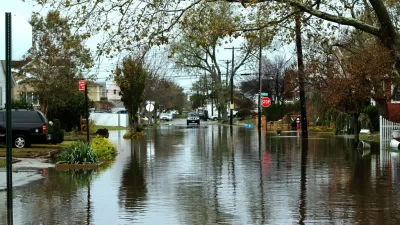One researcher argues that the division between transportation and land use policymaking at the federal level has harmed communities of color and encouraged unchecked sprawl.

Despite how deeply intertwined the issues of land use and transportation are, writes Yonah Freemark in Urban Wire, the two remain, administratively, "divided at the federal level." Freemark argues that "better planning and collaboration across the federal government could improve how communities are built and ensure their residents have access to more equitable outcomes."
Freemark's research "investigates in detail the major public debate about how to manage federal policy in transportation and land-use planning that occurred in the 1960s," when "there was neither a HUD nor DOT." At that time, "[h]ousing and land-use planning policy were run out of the Housing and Home Finance Agency (HHFA), and transportation policy was mostly run out of the US Department of Commerce."
After the creation of the Department of Housing and Urban Development (HUD) in 1965, the agency was tasked with managing "housing, land use, and transit planning" as well as "policy determination over highways in urban areas." This approach, argues Freemark, was undermined by the creation of the Department of Transportation (DOT) the following year, which "encouraged some congressmembers to think of transportation as independent, not integrated into the urban system." As a consequence of this and some congressmembers' disapproval of HUD's emphasis on the needs of Black residents, "in 1968, Congress moved all transportation planning to DOT, where it has remained since, isolated from housing and land-use planning."
Since the 1970s, Freemark writes, the "failure of federal administrators to plan for transportation and land use in parallel" has led to unchecked sprawl and a loss of access to public services for communities of color. Pointing to successful examples from other countries, he argues that "coordinating federal programs could improve US communities’ ability to plan for a less automobile dependent, more equitable future."

Alabama: Trump Terminates Settlements for Black Communities Harmed By Raw Sewage
Trump deemed the landmark civil rights agreement “illegal DEI and environmental justice policy.”

Study: Maui’s Plan to Convert Vacation Rentals to Long-Term Housing Could Cause Nearly $1 Billion Economic Loss
The plan would reduce visitor accommodation by 25% resulting in 1,900 jobs lost.

Planetizen Federal Action Tracker
A weekly monitor of how Trump’s orders and actions are impacting planners and planning in America.

Wind Energy on the Rise Despite Federal Policy Reversal
The Trump administration is revoking federal support for renewable energy, but demand for new projects continues unabated.

Passengers Flock to Caltrain After Electrification
The new electric trains are running faster and more reliably, leading to strong ridership growth on the Bay Area rail system.

Texas Churches Rally Behind ‘Yes in God’s Back Yard’ Legislation
Religious leaders want the state to reduce zoning regulations to streamline leasing church-owned land to housing developers.
Urban Design for Planners 1: Software Tools
This six-course series explores essential urban design concepts using open source software and equips planners with the tools they need to participate fully in the urban design process.
Planning for Universal Design
Learn the tools for implementing Universal Design in planning regulations.
Caltrans
Smith Gee Studio
Institute for Housing and Urban Development Studies (IHS)
City of Grandview
Harvard GSD Executive Education
Toledo-Lucas County Plan Commissions
Salt Lake City
NYU Wagner Graduate School of Public Service





























